Being able to spot emerging trends and shifts in global affairs as well as gaining expertise ahead of others are all key to becoming a successful chaebol heir.
In an era that stresses sensibility and communication, convergent thinking and studying abroad seem to have become top priorities for many.
It follows that when observing the educational paths the superrich families have taken overseas, commonalities are revealed. It becomes clear which schools are being preferred and how blood ties can often expand to school ties.
Moreover, it is noteworthy that the “third generation” of the business world is not only being exposed to foreign cultures at a younger age than previous generations, but also gradually beginning to eye China and other emerging nations as well.
Distinct school preferences
The owners of major Korean companies and their family members could, in terms of head count, account for half of the alumni association at George Washington University or the University of Southern California.
These two schools have been the most attended by corporate leaders who have studied abroad.
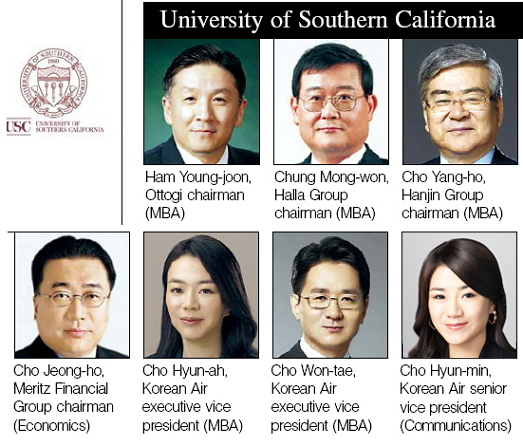
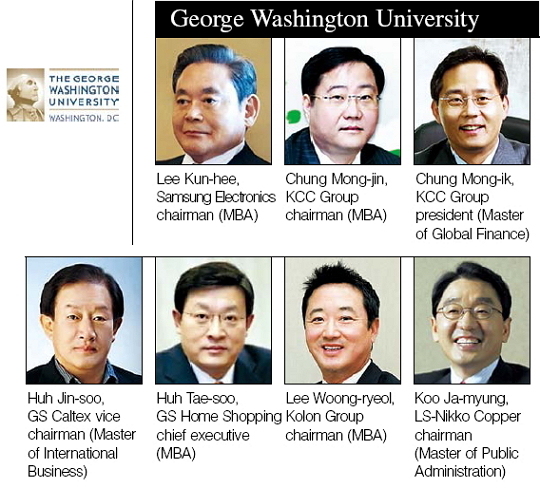
Some graduates of GWU include brothers Chung Mong-jin and Mong-ik of KCC Group and brothers Huh Jin-soo and Tae-soo of GS Group, not to mention none other than Samsung chairman Lee Kun-hee himself.
Kolon Group chairman Lee Woong-ryeol also attended GWU for his postgraduate studies in business administration.
While most of them studied management or international business at GWU, current LS-Nikko Copper chairman Koo Cha-myung, who also graduated from the school, specialized in public administration.
GWU’s popularity, especially among the second generation of Korea’s chaebol leaders, can be mainly attributed to the school’s prestige, deeply rooted in tradition.
Meanwhile, USC graduates include Halla Group chairman Chung Mong-won and Ottogi chairman Ham Young-joon, but more noticeably a large number from the Hanjin Group family.
Following the group’s chairman Cho Yang-ho, all three of his children received their degrees from USC.
Cho Jeong-ho, Cho Yang-ho’s younger brother and also the chairman of Meritz Financial Group, and Cho Su-ho, the late former chairman of Hanjin Shipping, are also USC alumni.
Apart from these two schools, the University of Chicago, New York University and Harvard University are also highly preferred schools among corporate Korea, while Wharton School of Business at the University of Pennsylvania ― named one of the top schools for MBA programs this year by U.S. News and World Report, alongside Harvard and Stanford University ― is also fast gaining attention.
Blood ties lead to school ties
As apparent in the Hanjin family, Korea’s superrich share a tendency to follow academic suit.
The LG family seems to have a strong focus on the University of Chicago and GWU.
LG Electronics vice chairman Koo Bon-joon received his MBA from the University of Chicago, where LS Cables & System chief executive Koo Ja-eun and LS-Nikko Copper chairman Koo Cha-myung, who also attended GWU for a degree in public administration, followed suit.
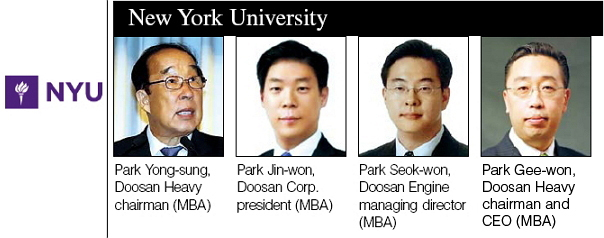
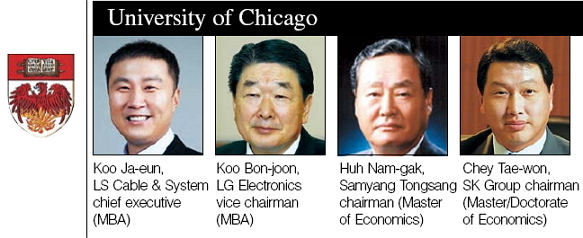
Samyang Tongsang chairman Huh Nam-gak, who is connected to LG through his in-laws, is also a graduate of the school.
Meanwhile, many in the Doosan family have preferred NYU and Boston University.
Doosan Heavy chairman Park Yong-sung and his two sons ― Doosan Corp. president Park Jin-won and Doosan Engine managing director Park Seok-won ― studied business administration at NYU.
Park Gee-won, Doosan Heavy chairman and CEO and also the second son of Doosan Group honorary chairman Park Yong-kon, also attended NYU, while Park Jeong-won, Doosan Corp. chairman and first son, and Park Yong-maan, Doosan Group chairman and CEO, did their MBA studies at BU.
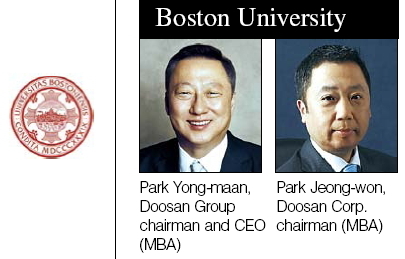
The desires of father and son to be alumni of the same school seem to be the primary reason behind this phenomenon.
Having good knowledge of the school often prompts the parent to recommend the school to the junior, while prioritized acceptance for families who have made considerable contributions to the school is also common among prestigious private colleges.
Early adopters of conglomerate circleIt was most common for the first- and second-generation chaebol owners to do their undergraduate studies in Japan and postgraduate studies in the United States, as was the case for Samsung Group chairman Lee Kun-hee and Hyosung Group chairman Cho Suk-rae. Getting an MBA in the United States became almost the standard for following generations.
But things are slightly different nowadays for the third-generation chaebol families.
More of them are starting their foreign education in high school in order to build their global connections and ideas early on.
Some examples are the sons of Hanwha Group chairman Kim Seung-yeon.
Kim Dong-kwan and Kim Dong-won both attended St. Paul High School in the United States and moved on to study politics at Harvard University and Southeast Asian studies at Yale University, respectively. The youngest son attended Dartmouth College.
Furthermore, China is also becoming a rising educational hub. SK Group chairman Chey Tae-won’s two daughters chose to attend high school in Beijing.
By The Korea Herald Special Report Team (
jhk@heraldcorp.com)












